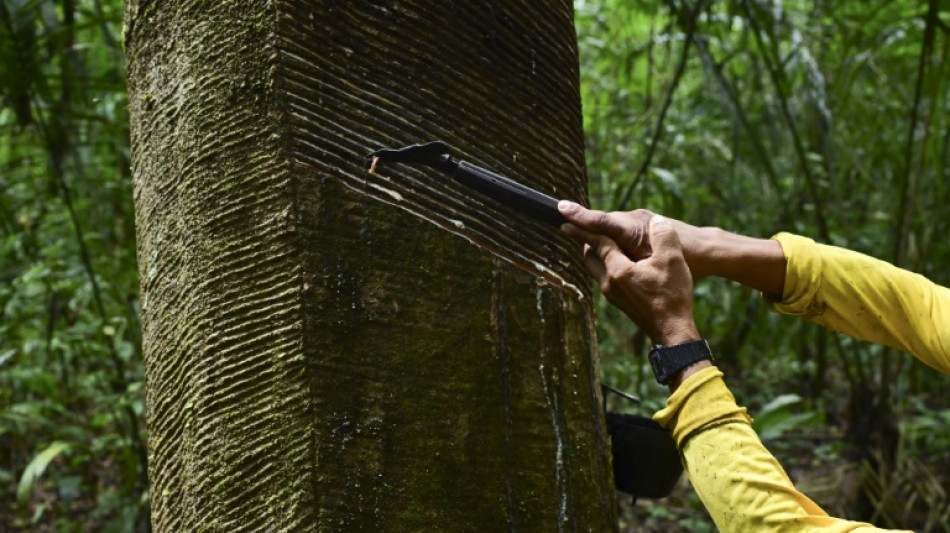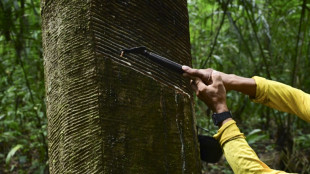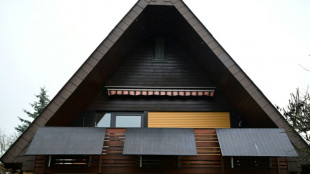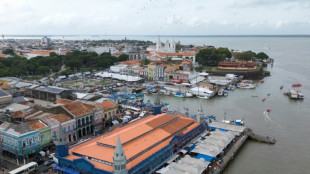
-
 Musk draws ire because 'isn't left-wing': Italy's Meloni
Musk draws ire because 'isn't left-wing': Italy's Meloni
-
Jimmy Carter honored at state funeral as US mourns

-
 Lebanon army chief Aoun becomes president after two-year void
Lebanon army chief Aoun becomes president after two-year void
-
Sarkozy tells court 'not a cent' of Libyan money in campaign funds

-
 Boniface out, Xhaka doubtful for Leverkusen's trip to Dortmund
Boniface out, Xhaka doubtful for Leverkusen's trip to Dortmund
-
What we know about the LA fires

-
 Clashes as crowds welcome Mozambique opposition leader home from exile
Clashes as crowds welcome Mozambique opposition leader home from exile
-
Aldcroft named England captain ahead of 2025 Women's Rugby World Cup

-
 Ukraine's leader calls for support as Trump's return opens 'new chapter'
Ukraine's leader calls for support as Trump's return opens 'new chapter'
-
Polish president says don't arrest Netanyahu at Auschwitz ceremony

-
 Ex-Scotland rugby captain Hogg spared jail after admitting he abused wife
Ex-Scotland rugby captain Hogg spared jail after admitting he abused wife
-
37 killed in north Syria clashes between pro-Turkey, Kurdish forces: monitor

-
 Italy's Meloni denies discussing SpaceX deal with Musk
Italy's Meloni denies discussing SpaceX deal with Musk
-
Wolves sign Ivory Coast defender Agbadou from Reims

-
 Lebanon army chief short of required majority in first round of president vote
Lebanon army chief short of required majority in first round of president vote
-
Beijing says EU imposed unfair trade barriers on Chinese firms

-
 Global stock markets mixed tracking US rates outlook
Global stock markets mixed tracking US rates outlook
-
West Ham appointment feels like 'Christmas' says new boss Potter

-
 Thousands welcome Mozambique opposition leader as he returns from exile
Thousands welcome Mozambique opposition leader as he returns from exile
-
US emissions stagnate in 2024, challenging climate goals: study

-
 China's electric and hybrid vehicle sales jump 40.7% in 2024
China's electric and hybrid vehicle sales jump 40.7% in 2024
-
UK FM Lammy refuses to condemn Trump comments on Greenland

-
 Potter named West Ham boss after Lopetegui sacking
Potter named West Ham boss after Lopetegui sacking
-
Blinken seeks to avert Syria turmoil with Europeans on final trip

-
 Mozambique opposition leader returns home, ready for government talks
Mozambique opposition leader returns home, ready for government talks
-
Waymo exec hopeful Trump will boost autonomous driving

-
 YouTube patriots? The men backing S. Korea's impeached president
YouTube patriots? The men backing S. Korea's impeached president
-
Top seeds Pegula, Paul surge into Adelaide semis

-
 Raspy-voiced hit machine Rod Stewart turns 80
Raspy-voiced hit machine Rod Stewart turns 80
-
Trade war worries loom over Las Vegas tech show

-
 America mourns former president Jimmy Carter at state funeral
America mourns former president Jimmy Carter at state funeral
-
Djokovic handed tough Australian Open draw, Sinner faces Jarry test

-
 Bok prop Nche wary of Dupont threat in Champions Cup
Bok prop Nche wary of Dupont threat in Champions Cup
-
Conceicao brings good vibes back to AC Milan after Super Cup triumph

-
 'We have lost everything': Despair in the Los Angeles fires
'We have lost everything': Despair in the Los Angeles fires
-
Australia frets over Meta halt to US fact-checking

-
 Japan startup hopeful ahead of second moon launch
Japan startup hopeful ahead of second moon launch
-
Ukraine allies to hold last defence meet before Trump takes office

-
 NBA-best Cavs win 11th in a row to end 15-game Thunder streak
NBA-best Cavs win 11th in a row to end 15-game Thunder streak
-
What you need to know about HMPV

-
 Bangladesh garment industry rebounds, but workers say little change
Bangladesh garment industry rebounds, but workers say little change
-
Asian markets drop as trades fret over US inflation, rates outlook

-
 Mozambique opposition leader due home amid tension over disputed vote
Mozambique opposition leader due home amid tension over disputed vote
-
Doping and a match made in heaven: Australian Open storylines

-
 Australia recall McSweeney for Sri Lanka Tests, Connolly set for debut
Australia recall McSweeney for Sri Lanka Tests, Connolly set for debut
-
Myanmar military adopts anti-junta fighters' drone tactics

-
 Lebanon set to finally elect president after two-year vacancy
Lebanon set to finally elect president after two-year vacancy
-
New twist in US-Cuba trademark fight over Havana Club rum

-
 CES tech looks to help world's aging population
CES tech looks to help world's aging population
-
Rubber tappers forge sustainable future in Amazon


Rubber tappers forge sustainable future in Amazon
As the sun rises over the Amazonian island of Marajo, Renato Cordeiro laces up his boots, grabs his knife, and heads out to tap his rubber trees.
Drop by drop, he collects the milky white sap, known as latex, that sustains him.
The recent revival of the rubber tapper trade in this impoverished northern Brazilian region has created jobs for families who once thrived during the Amazonian rubber boom, which collapsed in the late 20th century.
A local company called Seringo has enabled Cordeiro and more than 1,500 other rubber tappers to resume their craft. The company produces goods such as footwear while also protecting the forest, increasingly threatened by deforestation.
For Cordeiro, a wiry 57-year-old, the Amazon is his backyard.
Behind his stilt house on the Anajas River, dozens of natural rubber trees blend with centuries-old trees and palms typical of this island, surrounded by rivers on one side and the sea on the other.
- 'Family heritage' -
"I started tapping trees at age seven with my mother, deep in the forest," said Cordeiro, holding his knife, which has a protruding metal piece for making precise cuts in the bark.
With each incision made carefully to avoid harming the trunk, the native Amazonian tree begins to drip its latex into a container placed underneath. As it fills, Renato moves on to the next tree.
Each day, he collects about 18 liters (4.8 gallons), mixing it with vinegar to produce white rubber sheets. These hang on a rope for 10 days to dry before being sold to Seringo, which picks them up from his riverside home.
Cordeiro, a married father of three, beams with pride. After nearly two decades of scraping by through hunting and acai harvesting, he returned to rubber tapping in 2017 to protect what he calls his family heritage — the forest.
"I longed for this work to return," says Valcir Rodrigues, another rubber tapper and father of five, from a stilt house along the river north of Anajas.
"We want to leave a better world for our children, so we don't deforest," he says.
Rodrigues frequently confronts loggers who invade his land to cut down trees.
"They need to understand how much they harm the forest — and themselves — since many end up in debt to their employers," he explains.
Deforestation surged in Marajo when global demand for Amazonian rubber plummeted as countries like Malaysia began large-scale rubber tree plantations.
Today, however, rubber sustains Rodrigues's entire family. His wife and mother-in-law skillfully craft colorful artisanal goods sold primarily in Belem, the capital of Para state, to Marajo's east.
"I was a civil servant, but the local government never gave me a job. This is my first real trade, and I love it," said his mother-in-law Vanda Lima, a smiling 60-year-old.
- Expansion -
With one of Brazil's worst Human Development Index rankings, "it was necessary to create income in Marajo," says Zelia Damasceno, who co-founded Seringo with her husband to boost the region's bio-economy.
Initially focused on promoting artisanal work, the couple realized that rubber tappers were "unsatisfied," extracting latex sporadically for their spouses to use in making crafts.
"That's why we envisioned a second purpose — footwear — so they could also earn a living," says Damasceno, 59, from Para.
At its factory in Castanhal, about 300 kilometers (200 miles) east of Marajo, Seringo produces 200 pairs of biodegradable shoes daily, made from 70 percent rubber and 30 percent acai powder.
The company recently received support from the Para government to expand the number of rubber tappers it calls on in Marajo to 10,000.
That is part of a sustainable development program launched ahead of COP30, a UN climate conference scheduled for November in Belem.
Still, challenges remain, Damasceno admits: "Some young people don't want to follow this path. We must raise awareness about the importance of this work to preserve the forest and their future."
A.F.Rosado--PC



